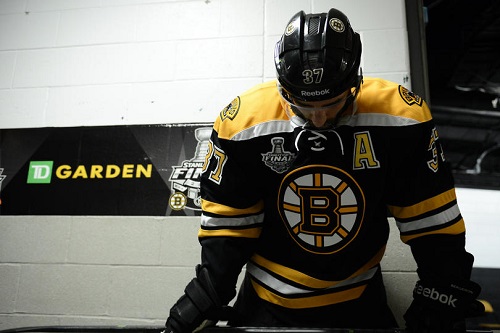The Dirty Secret of the 2013 Boston Bruins: A Game 6 Recap

BOSTON – The second Bryan Bickell scored at 18:44 of the third period to tie up Game 6, Bruins fans all over got that sinking feeling in their stomachs. They’d seen this movie before. Dave Bolland scored just 17 seconds later to put the Chicago Blackhawks up 3-2, and it was all too familiar for those who have watched the 2013 Boston Bruins. The Blackhawks won the Stanley Cup and, in doing so, they exposed the dirty little secret of this Bruins team: they take their foot off the accelerator when they have a chance to put their opponents away.
The signs were there in the strike-shortened regular season. Against the better teams in the Eastern Conference, the Bruins entered the final twenty minutes with a lead more often than not, and rarely ended the game with a win. On March 12th, Boston was up 2-0 on the Pittsburgh Penguins, only to end the game with a 3-2 loss. On March 5th, the Bruins jumped out to an early 3-0 lead on the Washington Capitals, and lost the game 4-3 in overtime. Just two days prior, they took a 3-2 score into the third period against the rival Montreal Canadiens, who beat the Black and Gold 4-3 in regulation. Throw in games against the Winnipeg Jets, Buffalo Sabres (twice), and another against the Capitals, and it starts to look like a trend.
These Bruins were just 3-3 with a chance to eliminate their opponents from the playoffs while they were a staggering 11-5 in all other games. Even worse, the Bruins only lost eight games in the entire postseason, and they had a lead in the third period in almost half of them. In the Stanley Cup Finals alone, the Bruins held a lead entering the third period three times, and only won one of those games. For a team vying for a Stanley Cup, that’s just not good enough.

(Brian Babineau/Getty Images)
Perhaps the answer lies in balanced scoring. During their 2011 Championship run, the Bruins were arguably the most balanced team in the league. They got contributions from all four lines, including a lot of help from the then-third line of Michael Ryder, Chris Kelly, and Rich Peverley. This year, the Bruins were a lot more top heavy, relying on Milan Lucic, David Krejci, and Nathan Horton, and the second line of Brad Marchand, Patrice Bergeron, and Jaromir Jagr. While the makeshift third line (Kelly, Daniel Paille, and Tyler Seguin) played well in the final games against the Blackhawks, the Bruins needed more.
The 2013 Boston Bruins were a flawed team, but it’s important to keep things in context. After all, only one team in the NHL ends the season with a championship, and the Bruins lost to a Blackhawks team that lost only seven games in regulation during the entire regular season. The Bruins played some fantastic hockey during their playoff run, and lifted a fan base and a city that desperately needed something to rally around. And there’s plenty of silver linings for the Bruins: Gregory Campbell’s PK shift in Game 3 of the Eastern Conference Finals remains one of the best examples of playoff hockey you’re likely to see, and the Bruins found out for sure that Tuukka Rask is their goaltender not just for the future, but also right now.
There’s a few more silver linings to consider: the 2013 Boston Bruins lacked that killer instinct, but it might make the 2014 edition of the Black and Gold that much hungrier for another championship. The Bruins will bring back a lot of the same players for next year, and are expected to sign Rask to a long-term deal this offseason. This offseason is also important for Seguin, and the Bruins will be even more dangerous if he can make the jump for 2014. Despite last night’s loss, there’s a lot to look forward to for this Bruins team. And, of course, there’s always next year.


